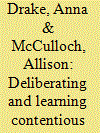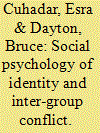| Srl | Item |
| 1 |
ID:
127020


|
|
|
|
|
| Publication |
2013.
|
| Summary/Abstract |
History education can either exacerbate polarization and division or it can have conciliatory potential. Looking at a number of divided societies, we identify trends in curriculum portrayals of inter-group conflict. Noting the power of re-telling the past, we argue for a conciliatory approach to textbook design that entails the inclusion of multiple narratives. We detail why groups need to set out their own account of events and discuss the importance of the way that groups develop their accounts. We recommend an institutional, process-based approach to textbook design grounded in the values of deliberative consociationalism and argue that the conciliatory approach is best pursued in a two-stage model of deliberations. We develop this model and focus on how deliberations might occur and with what restrictions, taking seriously concerns about the applicability of deliberation in divided societies.
|
|
|
|
|
|
|
|
|
|
|
|
|
|
|
|
| 2 |
ID:
106355


|
|
|
|
|
| Publication |
2011.
|
| Summary/Abstract |
This paper reviews the seminal theories of social psychology which have guided scholarship on inter-group conflicts and describes how these theories have been used by conflict resolution practitioners to design Track Two diplomacy initiatives among citizens in conflict zones. The authors hope that such a review will provide scholars of conflict resolution and international politics with a better understanding of how complex social theories are adapted for use in the applied world, and how gaps between theory and practice can be identified and addressed. The paper begins with an overview of three of the main theoretical contributions of social psychology to the problem of inter-group conflict: social identity theory, stereotyping and prejudice, and contact theory. We then review how these theories have been applied by conflict resolution specialists in international and ethnic conflicts as they have sought to moderate intergroup hostilities in conflict zones. The paper concludes with an analysis of the gaps between theory and practice, namely: theory of change gap, transfer strategies gap, and unit of analysis gap. Finally, based on the reviewed social psychology research, the article makes policy recommendations about how these gaps between theory and practice can be narrowed.
|
|
|
|
|
|
|
|
|
|
|
|
|
|
|
|